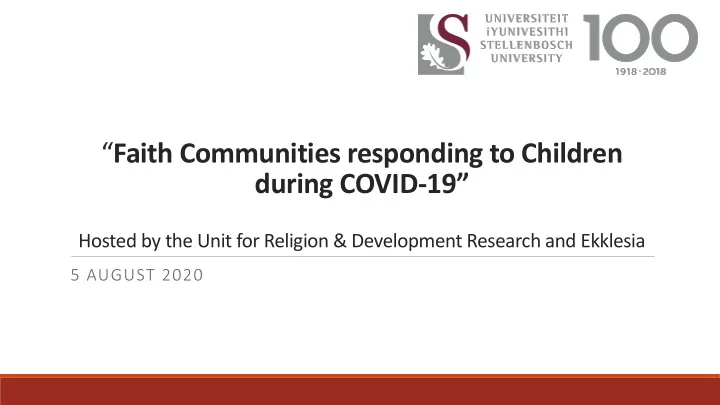

“ Faith Communities responding to Children during COVID- 19” Hosted by the Unit for Religion & Development Research and Ekklesia 5 AUGUST 2020
Children & COVID-19 ❑ Disproportionately affected due to school closures ❑ Loss of school meals and family level hunger ❑ Loss of peer and wider family support structures – isolation, loneliness ❑ Fear and stress about getting sick, about others, about the future ❑ Increased risks of violence and abuse – in homes and online ❑ Loss of routine and structure – cause confusion and anxiety ❑ Mental health and psycho social support to handle bereavement and grief ❑ Listening to children’s voices, and taking seriously their desire to contribute Source: World Vision International Report 2020. Children’s Voices in times of Covid -19
The socio-ecological model NATIONAL/INTERNATIONAL INSTITUTIONS ↑ COMMUNITIES FAITH PLAYS ROLES AT EACH LEVEL FAMILIES ↓ CHILD
Supporting families ( O)ne of the most important roles that churches can play, or faith groups can play is prevention. They can support new parents, they can support parenting by helping people, parenting is a difficult thing to do…there is no manual of how to do this… If parents can be supported … to create nurturing and caring environments for themselves and their children, then we will go a long way to preventing abuse and neglect. I think that is a key role. (Interview with child expert South Africa, quoted in Palm 2019:p17) The way that certain patriarchal religions conceive the world is that there is a hierarchy … someone at the top…in charge, they are punitive, powerful, in control and if you don’t do what they say you are going to get thumped in one way or another … the church and parenting needs to move away from punishment to discipline … Faith groups should be helping parents see that and raise their children in caring, nurturing environments. (Interview with child expert in South Africa, cited in Palm 2019:p29)
The Unique Role of Spiritual Capital in children’s lives Spiritual Capital - faith traditions draw on and engage faith resources and authority e.g. prayer, meditation, sermons, sacred texts and religious rituals. This can help to transform beliefs and practices that underpin child maltreatment, reaffirm religious imperatives for child protection and prevention and stand against the normalisation or silencing of abuse or of children’s needs and voices . Social Capital - faith actors bring their social influence, organisations, funds, buildings, people and motivation to support children at this time. However, they are often used as instrumentally valuable only. This involves limited or no engagement with their spiritual dimensions Access Capital - faith leaders are trusted gatekeepers to local communitiesThey are used by child related services to 'open the gate' only. They are not seen to play ongoing positive roles in the task of child protection and may even be seen as a liability by secular agencies.
Hands that harm or Hands that heal “Progress towards abolishing corporal punishment is being made, but millions of the world’s children still suffer from humiliating acts of violence and these violations of their rights as human beings can have serious lifelong effects. Violence begets violence and we shall reap a whirlwind. Children can be disciplined without violence that instils fear and misery … If we really want a peaceful and compassionate world, we need to build communities of trust where children are respected, where home and school are safe places to be and where discipline is taught by example” . (Archbishop Emeritus Desmond Tutu, 2006:11) ” (A)ll recorded encounters between Jesus and children were kind, gentle and respectful with children seen as central to the new social order that Jesus initiated . By blessing and laying his hands on children, Jesus received children as people in their own right and gave them status, respect and dignity” . (Churches Network for Non-Violence 2015:3)
Being God’s hands in our world today
Q & A with our presenters Thank you for joining us. The webinar recording will be circulated to all attendees soon http://blogs.sun.ac.za/urdr/
Recommend
More recommend